初中英语句型转换--特殊疑问句
句子变换一般疑问句与特殊疑问句

句子变换一般疑问句与特殊疑问句句子变换:一般疑问句与特殊疑问句在英语语法中,句子变换是指将陈述句转换为疑问句或反过来的过程。
疑问句可以分为一般疑问句和特殊疑问句,它们在句法结构和语序上有所不同,需要我们在理解和运用时熟练掌握。
本文将介绍一般疑问句和特殊疑问句的变换规则和例子,并探讨它们在交流中的应用。
一、一般疑问句一般疑问句是一种以助动词、系动词或情态动词开头的疑问句,其结构为:助动词/系动词/情态动词 + 主语 + 其他部分。
例如:1. You are a teacher.(你是一名老师。
)Are you a teacher?(你是老师吗?)2. He can swim.(他会游泳。
)Can he swim?(他会游泳吗?)3. They have finished their homework.(他们已经完成了作业。
)Have they finished their homework?(他们完成作业了吗?)4. She has been to France.(她去过法国。
)Has she been to France?(她去过法国吗?)1. 助动词/系动词/情态动词的变换:将助动词/系动词/情态动词放在句子的句首,并使用主语和其他部分保持原来的语序。
2. 一般疑问句的回答:一般疑问句的回答通常是"Yes"或"No",而且回答时需要用到助动词/系动词/情态动词。
以第一个例子为例,回答可以是"Yes, I am."或"No, I am not."二、特殊疑问句特殊疑问句是以特殊疑问词(如who, what, when, where, why, how 等)开头的疑问句,用于询问具体事实、情况或原因。
特殊疑问句的结构为:特殊疑问词 + 助动词/系动词/情态动词 + 主语 + 其他部分。
例如:1. He goes to school by bus.(他乘公交车去学校。
英语句型转换疑问句

英语句型转换疑问句
英语句型转换疑问句有以下几种情况:
1. 陈述句变为一般疑问句:
将陈述句中的助动词或情态动词移到句首即可。
例如:
He is a student.(他是学生。
)
→ Is he a student?(他是学生吗?)
2. 含有疑问词的陈述句变为特殊疑问句:
将疑问词放到句首,并用一般疑问句的句式来构造问句。
例如:
She is going to the store.(她要去商店。
)
→ Where is she going?(她要去哪里?)
3. 反意疑问句:
在陈述句的结尾加上一个反义的简短问句。
例如:
You like ice cream, don't you?(你喜欢冰淇淋,不是吗?)
4. 隔离疑问句:
在陈述句之后,用一个问句来表示询问。
例如:
I hope you can come.(我希望你能来。
)
→ I hope you can come, can you?(我希望你能来,你能来吗?)
5. 一般疑问句变为特殊疑问句:
在一般疑问句的基础上,将疑问词放到句首来构造特殊疑问句。
例如:
Can she sing?(她会唱歌吗?)
→ Wha t can she do?(她会做什么?)
需要注意的是,疑问句的语序通常是将助动词或情态动词提到主语之前,或将疑问词提到句首。
同时,疑问句通常需要用升调发音。
英语中特殊疑问句及对划线部分提问专题

英语中特殊疑问句及对划线部分提问专题(一)特殊疑问句对画线部分提问”是初中英语测试中常见的一种句型转换题型,该类试题实际上就是把所给的陈述句变为特殊疑问句。
由于有很多同学答题时感到茫然,且错误率很高,故本文将谈谈这种题目的解题方法。
一、选准疑问词特殊疑问句共有两种基本结构:1,疑问词(或其修饰的主语)+谓语+其它成份+?;2,疑问词(或其修饰的词语)+一般疑问句+?。
无论是哪一类特殊疑问句,均以疑问词开头,故选准疑问词是解答好对画线部分提问题目的关键。
要想选准疑问词,则必须首先弄清画线部分在句子中的成份,如对主语部分提问,如果指人要用who,若指物就用what;对表语提问情况比较复杂,若指物用what,若指人的身份用who,指人的职业用what;若为数量词,指年龄用howold,指时间用what time,指距离用how far,指运算结果用how much等;对谓语部分提问用what,且以do的适当形式替代谓语动词;对宾语部分提问,若指人用whom 或who,若指物用what或which,若是介词的宾语(who除外)可和介词一起提到句首;对定语提问,需要把替代它的疑问词和它所修饰的词一起提到句首,若问“谁的”用whose,若问“哪个(些)”用which或what,若问“数量”用how many(可数)或how much(不可数);若对状语部分提问,指时间用when(几点几分用what t ime),指地点用where,指原因用why,指程度用how等等。
二、疑问句的语序在选准疑问词之后,紧接着便要判定其后是用陈述句语序,还是用一般疑问句语序。
如果是对主语部分提问,疑问词后要用陈述句语序,即把画线部分用疑问词替代,再把句末的句号改为问号便可,句子的其它部分不要作任何改动。
如果画线部分不是主语,疑问词后必须接倒装语序,也就是接原句的一般疑问句形式。
但要注意:1,当原句里有动词be,助动词have(has),will,shall或情态动词can,may,must等时,将它们移到主语之前(疑问词之后)就成了一般疑问句;2,当原句里无上述词语时,应根据时态在主语之前加do(does)、did等助动词来构成一般疑问句,谓语动词用原形。
初中英语句型转换(陈述句变一般疑问句特殊疑问句及练习)
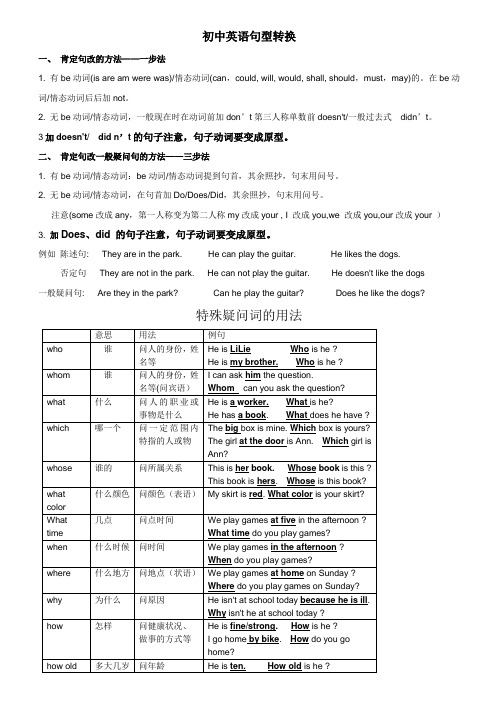
3 加 doesn't/ did n’t 的句子注意,句子动词要变成原型。
二、 肯定句改一般疑问句的方法——三步法
1. 有 be 动词/情态动词:be 动词/情态动词提到句首,其余照抄,句末用问号。
2. 无 be 动词/情态动词,在句首加 Do/Does/Did,其余照抄,句末用问号。
注意(some 改成 any,第一人称变为第二人称 my 改成 your , I 改成 you,we 改成 you,our 改成 your )
My book is over there. Whose book is over there ?
主语的定语 主语 谓语
疑问词 主语 谓语
以上两点方法都是:
用正确的疑问词代替画线部分,再把句号改为问号,其余部分一般不做改变
3.对表语或宾语的定语部分提问,其语序是:
疑问词+表语或宾语(画线部分所修饰的名词)+一般疑问句(省略画线部分和它所修饰的名词)
一般疑问句: Are they in the park?
Can he play the guitar?
Does he like the dogs?
综合练习: 1. The children have a good time in the park. 否定句:___________________________________ 一般疑问句:___________________________________ 2. There are about nine hundred people at the concert.(音乐会) 否定句:_________________________________ 一般疑问句:________________________________________ 对划线部分提问:____________________________________ 3. There is only one problem. 否定句:_____________________________________ 一般疑问句:________________________________________ 肯定/否定回答:____________________________________ 4. Ann does her homework every evening. 否定句:__________________________________________ 一般疑问句:________________________________________ 对划线部分提问:____________________________________ 5. I read an English book every day. 否定句:__________________________________________ 一般疑问句:________________________________________ 肯定/否定回答:____________________________________ 对划线部分提问:____________________________________ 6. My brother is in the park now. 否定句:____________________________________ 一般疑问句:________________________________________ 肯定/否定回答:__________________________ 对划线部分提问:____________________________________ 7. She has some bread for lunch today. 否定句:__________________________________________ 一般疑问句:_________________________________ 肯定/否定回答:____________________________________ 8. They read English every day. 否定句:___________________________________ 一般疑问句:________________________________________ 肯定/否定回答:____________________________________ 对划线部分提问:____________________________________
七年级英语上特殊疑问句
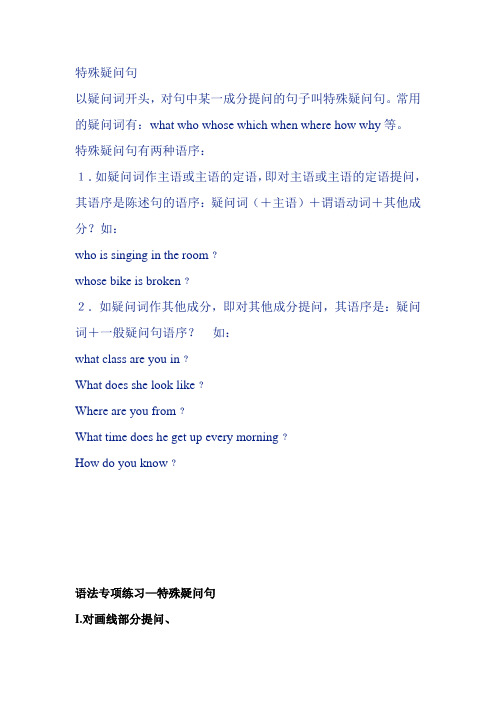
特殊疑问句以疑问词开头,对句中某一成分提问的句子叫特殊疑问句。
常用的疑问词有:what who whose which when where how why等。
特殊疑问句有两种语序:1.如疑问词作主语或主语的定语,即对主语或主语的定语提问,其语序是陈述句的语序:疑问词(+主语)+谓语动词+其他成分?如:who is singing in the room﹖whose bike is broken﹖2.如疑问词作其他成分,即对其他成分提问,其语序是:疑问词+一般疑问句语序?如:what class are you in﹖What does she look like﹖Where are you from﹖What time does he get up every morning﹖How do you know﹖语法专项练习—特殊疑问句I.对画线部分提问、1.They bought a new bike yesterday.____________________________________________________ 2.She is a nurse .____________________________________________________ 3.She is my teacher.____________________________________________________ 4.He bought the red one .____________________________________________________ 5.It is my coat .____________________________________________________ 6.I am looking for my sister .____________________________________________________ 7.I get up at six .____________________________________________________ 8.I am from Hubei .____________________________________________________ 9.I went to school late because I got up late.____________________________________________________ 10. It is windy ._____________________________________________________ 11. I am getting on well with it._____________________________________________________ 12. My bag is red .______________________________________________________ 13. The book is Li Hua’s.______________________________________________________ 14. I like math best.______________________________________________________ 15. They are five yuan .______________________________________________________ 16. I wash it twice a week .______________________________________________________ 17. He will be back in four days .______________________________________________________ 18. I didn’t come to class yesterday because I was ill .______________________________________________________ 31.He often has lunch in the factory.he often lunch?32.They will come back in a month.will they come back?33.He hurt his leg last Sunday.he hurt his leg ?34.I got up at six this morning .you up this morning ?35.They were drawing a horse when I came in.they when I came in ?36.I didn't go to school because I had a bad cold.you go to school?37.You'd better take the No.3 bus.bus I better take?38.He's feeling well.he feeling ?39.The girl in a red coat is my sister.is your sister?40.He comes to China once a year.he to China?41. He goes to see his grandma ( twice a week ). (对括号部分提问)_________________________________________________?42. My father goes to work by car. ( 改为特殊疑问句)__________________________________________________? 43. It take ( 15 minutes ) for a ferry to cross the river. ( 对括号部分提问)__________________________________________________? 44. You can dial ( 110 ) to call the police. ( 对括号部分提问)_______ ________ can you dial to call the police45. Ted put his bag in the desk . ( 改为特殊疑问句)_____ ______ Ted _____ in the desk?46. The students ( went camping ) last week. (对括号部分提问)_________________________________________________?47. 3 and 9 is 12. (改为特殊疑问句)_________________________________________________?48. Diogenes came from ( Greece ). (对括号部分提问)_____ _____ Diogenes ______ _______?49. The way to keep fit is ( to eat food and take morn exercise). (对括号部分提问)_______ _______ the way to _______ _______?50. We landed (on an unexplored planet ) . ( 对括号部分提问)______ ______ you land ?参考答案1.What did they buy yesterday? 2. What is she? 3. Who is she? 4. Which one did he buy? 5. Whose coat is it? 6. Who do you looking for? 7. When do get up? 8. Where are you from? 9. Why are you late? 10. What is the weather like today? 11. How are you get on with it? 12. What color is your bag? 13. Whose bag is it? 14. What subject do you like best? 15. How much are they? 16. How often do you wash it? 17. How soon will he be back? 18. Why didn’t you come to class yesterday?31.Where does;have 32.How soon 33.When did;hurt 34.What time did;get 35.What were;doing 36.Why didn't 37.Which;had 38.How is 39.Which girl 40.How often does come. 41. How often does he go to see his grandma? 42. How does your father go to work ? 43. How long does it take for a ferry to cross the river? 44. What number 45 . What did ; put 46. What did students do last week? 47. What is 3 and 9? 48. Where did; came from? 49. Which is ; keep fit 50. Where did。
句型转换(陈述句变一般疑问句特殊疑问句及练习)
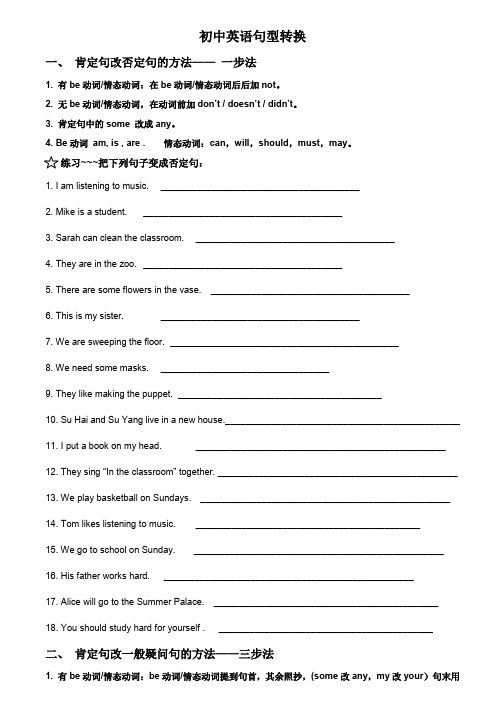
初中英语句型转换一、肯定句改否定句的方法——一步法1. 有be动词/情态动词:在be动词/情态动词后后加not。
2. 无be动词/情态动词,在动词前加don’t / doesn’t / didn’t。
3. 肯定句中的some 改成any。
4. Be动词am, is , are . 情态动词:can,will,should,must,may。
练习~~~把下列句子变成否定句:1. I am listening to music. _______________________________________2. Mike is a student. _______________________________________3. Sarah can clean the classroom. _______________________________________4. They are in the zoo. _______________________________________5. There are some flowers in the vase. _______________________________________6. This is my sister. _______________________________________7. We are sweeping the floor. ___________________________8. We need some masks. _________________________________9. They like making the puppet. _________________________________10. Su Hai and Su Yang live in a new house.______________________________________________11. I put a book on my head. _________________________________________________12. They sing “In the classroom” together. _______________________________________________13. We play basketball on Sundays. _________________________________________________14. Tom likes listening to music. ____________________________________________15. We go to school on Sunday. _________________________________________________16. His father works hard. _________________________________________________17. Alice will go to the Summer Palace. ____________________________________________18. You should study hard for yourself . __________________________________________二、肯定句改一般疑问句的方法——三步法1. 有be动词/情态动词:be动词/情态动词提到句首,其余照抄,(some改any,my改your)句末用问号。
英语所有句型转换的方法(陈述句变否定句-一般疑问句特殊疑问句及练习)

英语所有句型转换的方法基本助动词只有三个:be, do, have, 他们没有词汇意义,只有语法作用,如协助构成进行体,完成体,被动态,否定句,疑问句等。
一、肯定句改否定句的方法——一步法1、在be动词后加not。
如:is not ,are not ,am not,was not,were not;2、在can,等后加not。
如:cannot3、上述都没有的,在动词前加助动词否定形式do not, does not. (don’t/doesn’t)4、some 改成any。
二、肯定句改一般疑问句的方法——三步法1、把be动词放在句首,剩下的照抄,(some 改成any,my改成your等)句点改成问号。
2、把can,等放到句首,剩下的照抄,(some 改成any,my改成your等)句点改成问号。
例如:陈述句: They are in the park. He can play the guitar.. 一般疑问句: Are they in the park? Can he play the guitar?把下列句子变成一般疑问句1. I am listening to music._______________________________________2. Mike is a student._______________________________________3. Sarah can clean the classroom.________________________________________4. They are in the zoo.________________________________________5. There are some flowers in the vase.________________________________________6.This is my sister._________________________________________7.We are sweeping the floor.__________________________________________3、上述都没有的,在句首请助动词Do/Does帮忙,剩下的照抄,(some 改成any,my改成your等)句点改成问号。
初中英语七年级必备-整理版-句型转换(陈述句变一般疑问句特殊疑问句及测验)
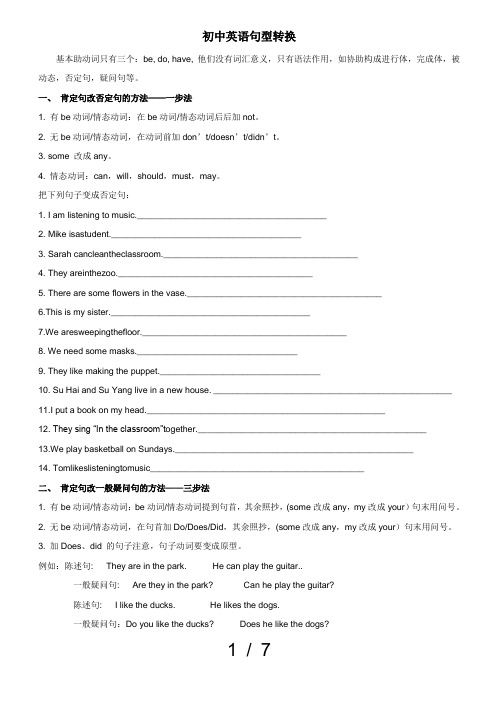
初中英语句型转换基本助动词只有三个:be, do, have, 他们没有词汇意义,只有语法作用,如协助构成进行体,完成体,被动态,否定句,疑问句等。
一、肯定句改否定句的方法——一步法1. 有be动词/情态动词:在be动词/情态动词后后加not。
2. 无be动词/情态动词,在动词前加don’t/doesn’t/didn’t。
3. some 改成any。
4. 情态动词:can,will,should,must,may。
把下列句子变成否定句:1. I am listening to music._______________________________________2. Mike isastudent._______________________________________3. Sarah cancleantheclassroom.________________________________________4. They areinthezoo.________________________________________5. There are some flowers in the vase.________________________________________6.This is my sister._________________________________________7.We aresweepingthefloor.__________________________________________8. We need some masks._________________________________9. They like making the puppet._________________________________10. Su Hai and Su Yang live in a new house. _________________________________________________11.I put a book on my head._________________________________________________12. They sing “In the classroom”t ogether._______________________________________________13.We play basketball on Sundays._________________________________________________14. Tomlikeslisteningtomusic____________________________________________二、肯定句改一般疑问句的方法——三步法1. 有be动词/情态动词:be动词/情态动词提到句首,其余照抄,(some改成any,my改成your)句末用问号。
(完整版)句型转换(陈述句变一般疑问句特殊疑问句及练习)
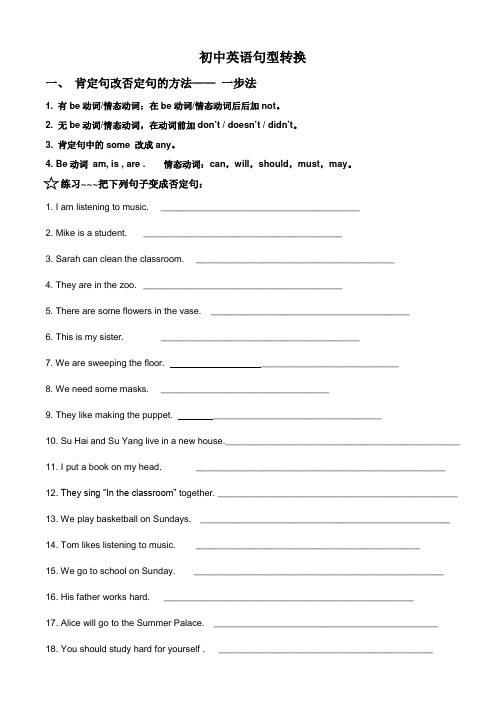
初中英语句型转换一、肯定句改否定句的方法——一步法1. 有be动词/情态动词:在be动词/情态动词后后加not。
2. 无be动词/情态动词,在动词前加don’t / doesn’t / didn’t。
3. 肯定句中的some 改成any。
4. Be动词am, is , are . 情态动词:can,will,should,must,may。
练习~~~把下列句子变成否定句:1. I am listening to music. _______________________________________2. Mike is a student. _______________________________________3. Sarah can clean the classroom. _______________________________________4. They are in the zoo. _______________________________________5. There are some flowers in the vase. _______________________________________6. This is my sister. _______________________________________7. We are sweeping the floor. ___________________________8. We need some masks. _________________________________9. They like making the puppet. _________________________________10. Su Hai and Su Yang live in a new house.______________________________________________11. I put a book on my head. _________________________________________________12. They sing “In the classroom” together. _______________________________________________13. We play basketball on Sundays. _________________________________________________14. Tom likes listening to music. ____________________________________________15. We go to school on Sunday. _________________________________________________16. His father works hard. _________________________________________________17. Alice will go to the Summer Palace. ____________________________________________18. You should study hard for yourself . __________________________________________1. 有be动词/情态动词:be动词/情态动词提到句首,其余照抄,(some改any,my改your)句末用问号。
句型转换和特殊疑问句的语法
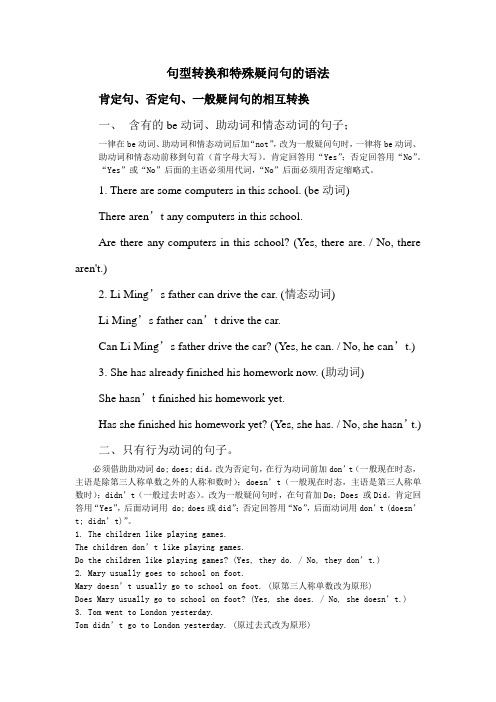
句型转换和特殊疑问句的语法肯定句、否定句、一般疑问句的相互转换一、含有的be动词、助动词和情态动词的句子;一律在be动词、助动词和情态动词后加“not”,改为一般疑问句时,一律将be动词、助动词和情态动前移到句首(首字母大写)。
肯定回答用“Yes”;否定回答用“No”。
“Yes”或“No”后面的主语必须用代词,“No”后面必须用否定缩略式。
1. There are some computers in this school. (be动词)There aren’t any computers in this school.Are there any computers in this school? (Yes, there are. / No, there aren't.)2. Li Ming’s father can drive the car. (情态动词)Li Ming’s father can’t drive the car.Can Li Ming’s father drive the car? (Yes, he can. / No, he can’t.)3. She has already finished his homework now. (助动词)She hasn’t finished his homework yet.Has she finished his homework yet? (Yes, she has. / No, she hasn’t.)二、只有行为动词的句子。
必须借助助动词do; does; did。
改为否定句,在行为动词前加don’t(一般现在时态,主语是除第三人称单数之外的人称和数时);doesn’t(一般现在时态,主语是第三人称单数时);didn’t(一般过去时态)。
改为一般疑问句时,在句首加Do;Does 或Did。
肯定回答用“Yes”,后面动词用 do; does或did”;否定回答用“No”,后面动词用don’t (doesn’t; didn’t)”。
初中英语句型转换
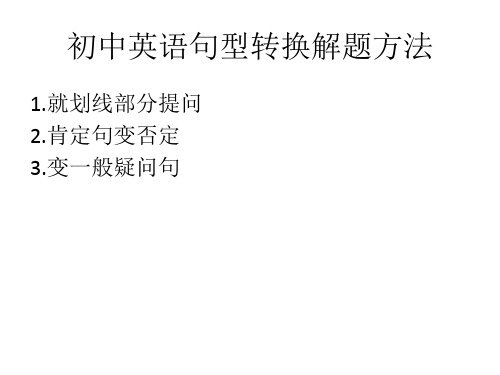
→How many books are there on the desk?
(二)当原句里无上述词语时,应根据时态在主语 之前加do(does)、did等助动词来构成一般疑问句, 谓语动词用原形
三、抄写剩余部分 在前两步做好之后,接着就是 要把原句的剩余部分再抄写一遍,在
抄写过程中也不可忽视以下几个问题:
(一)要删去画线部分(若画线部分是谓语,应用 do的适当形式替代);
8:对“颜色”划线,用what colour, 如果颜 色做定语,what colour 后要跟被修饰名词。
Her sweater is red. --- what color is her sweater? 9:对名词所有格,名词性物主代词划线用
whose, 如果作定语,whose 后后要跟被修 饰的名词。
• (三)对谓语部分提问时,使用“疑问词 (what)+一般疑问句”。其作法是:一般把疑问词 what放在句首,然后将原句改为一般疑问句,在 改为一般疑问句时,根据原句时态将do的适当形 式放在删去的划线位置。如:
• 1. Wei Feng is going to dance in the park this afternoon. →What is Wei Feng going to do in the park this afternoon?
What are the children doing on the hill?
3. She has four lessons in the morning.
句型转换陈述句变一般疑问句特殊疑问句及练习修订版
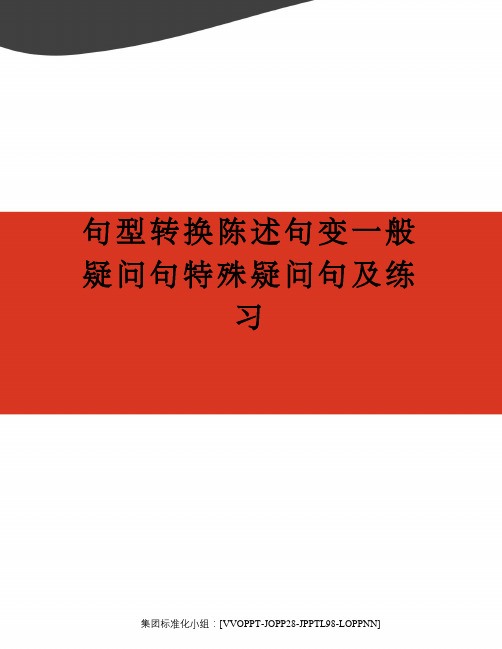
句型转换陈述句变一般疑问句特殊疑问句及练习集团标准化小组:[VVOPPT-JOPP28-JPPTL98-LOPPNN]初中英语句型转换一、肯定句改否定句的方法——一步法1. 有be动词/情态动词:在be动词/情态动词后后加not。
2. 无be动词/情态动词,在动词前加don’t / doesn’t / didn’t。
3. 肯定句中的some 改成any。
4. Be动词 am, is , are . 情态动词:can,will,should,must,may。
~~~把下列句子变成否定句:1. I am listening to music. _______________________________________2. Mike is a student. _______________________________________3. Sarah can clean the classroom. _______________________________________4. They are in the zoo. _______________________________________5. There are some flowers in the vase. _______________________________________6. This is my sister. _______________________________________7. We are sweeping the floor. ___________________________8. We need some masks. _________________________________9. They like making the puppet. _________________________________10. Su Hai and Su Yang live in a new house.______________________________________________11. I put a book on my head. _________________________________________________12. They sing “In the classroom” together._______________________________________________13. We play basketball on Sundays. _________________________________________________14. Tom likes listening to music. ____________________________________________15. We go to school on Sunday. _________________________________________________16. His father works hard. _________________________________________________17. Alice will go to the Summer Palace. ____________________________________________18. You should study hard for yourself . __________________________________________二、肯定句改一般疑问句的方法——三步法1. 有be动词/情态动词:be动词/情态动词提到句首,其余照抄,(some改any,my改your)句末用问号。
初中英语句型转换

句型转换“句型转换”题主要有两大类:一是基本句式的转换;二是同义句的转换。
基本句式的转换一、基本句式的转换主要是指“肯定句、否定句、一般疑问句、特殊疑问句、反意疑问句和选择疑问句、祈使句、感叹句”的转换。
1.肯定句、否定句和一般疑问句的转换(1)含有be动词(am,is,are,was,were)、助动词(do,does,did)和情态动词(can,could,should,will,would,may,might)的句子;肯定句改为否定句:直接在be动词、助动词、情态动词后面加not 肯定句改为一般疑问句时,一律将be动词、助动词和情态动前移到句首(首字母大写)。
肯定回答用“Yes”;否定回答用“No”。
“Yes”或“No”后面的主语必须用代词,“No”后面必须用否定缩略式。
练习:1、改为否定句:There are some pay phones on that street.Tony will travel around the world.He can cook Chinese food.2、改为一般疑问句,并作肯定、否定回答There is a hotel next to my school.Bridge Street is a good place to have fun.We are cleaning the room now.2)只含有行为动词的句子必须借助助动词do;does;did改为否定句时,直接在行为动词后面加don’t(一般现在时态,主语是除第三人称单数之外的人称和数时),doesn’t(一般现在时态,主语是第三人称单数时),didn’t(一般过去时态)改为一般疑问句时,在句首加Do,Does或Did。
肯定回答用“Yes”,后面动词用do;does或did”;否定回答用“No”,后面动词用don't;doesn't;didn't。
练习:1、改为否定句Mary often plays sports after dinner.Alice attends the lecture once a week.Mike drew a picture on the blackboard.2、改为一般疑问句The children like playing games.Mary usually goes to school on foot.Tom went to London yesterday.2.特殊疑问句的转换把句子转换为特殊疑问句,首先要确定划线部分的“疑问词”,人、物、时间、地点、原因、数量等分别用:who;whose;what;when;where;why;how;how many;how much;how often;how old;how long等。
初一英语语法--句型转换(详细内容)

初一英语语法--句型转换(详细内容)初一英语语法—句型转换内容:陈述句:肯定句否定句疑问句:一般疑问句特殊疑问句一.肯定句变否定句1.句子中有be,在be后加not。
(be动词有am , is , are, was, were)1)I am a student. I am not a student.2)They are blue . They aren’t blue.3) He is Kangkang. He is n’t Kangkang .4) I was ten last year. I wasn't ten yesterday.5) He was good at English. He wasn't good at English.6) They were at home last Sunday. They weren't at home last Sunday.练习:把下列句子变为否定句1.His father is an English teacher._____________________________2.He is crying under the tree. ___________________________ __3.He was thirteen years old two years ago._______________________4.They are very lucky.______________________________________5.t the family was poor.6.My voice was too weak.2.谓语是动词原形,在动词前加don’t。
7.I have a book . I don’t have a book.8.They like Chinese . They don’t like Chinese.9.3) We come from China. We don’t come from China.3.谓语动词是第三人称单数,在动词前加doesn’t,动词用原形。
句型转换陈述句变一般疑问句特殊疑问句及练习

1.有be动词/情态动词:be动词/情态动词提到句首,其余照抄,(some改any,my改your)句末用问号。
2.无be动词/情态动词,在句首加Do/Does/Did,其余照抄,(some改any,my改your)句末用问号。
3.加does、did的句子注意,句子动词要变成原型。
8. We need somemasks._________________________________
9.They likemakingthe puppet.ﻩ_________________________________
10.SuHaiand Su Yanglivein anewhouse.______________________________________________
11.Iputabook onmy head.ﻩ_________________________________________________
12.Theysing“In the classroom”together._______________________________________________
10. SuHai and SuYang livein anew house.______________________________________
7.Weare sweeping thefloor.__________________________________________
8. Weneedsomemasks._________________________________
9.They likemaking thepuppet._________________________________
句型转换特殊疑问句
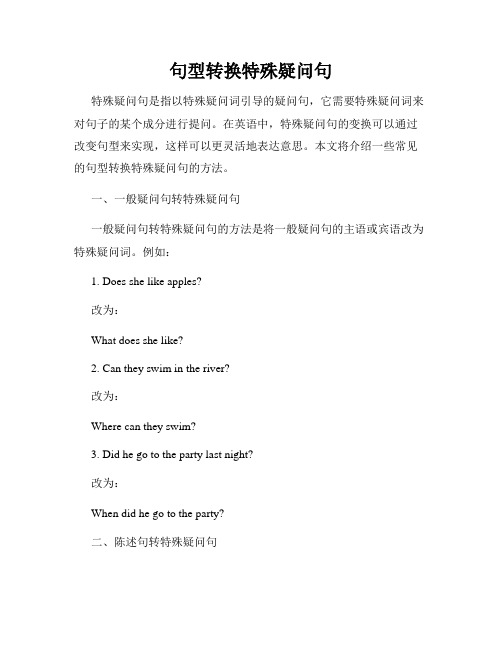
句型转换特殊疑问句特殊疑问句是指以特殊疑问词引导的疑问句,它需要特殊疑问词来对句子的某个成分进行提问。
在英语中,特殊疑问句的变换可以通过改变句型来实现,这样可以更灵活地表达意思。
本文将介绍一些常见的句型转换特殊疑问句的方法。
一、一般疑问句转特殊疑问句一般疑问句转特殊疑问句的方法是将一般疑问句的主语或宾语改为特殊疑问词。
例如:1. Does she like apples?改为:What does she like?2. Can they swim in the river?改为:Where can they swim?3. Did he go to the party last night?改为:When did he go to the party?二、陈述句转特殊疑问句陈述句转特殊疑问句的方法是将陈述句中的句子成分变为以特殊疑问词引导的特殊疑问句。
例如:1. She is going to the supermarket.改为:Where is she going?2. They went to the beach yesterday.改为:When did they go to the beach?3. John bought a new car.改为:Who bought a new car?三、特殊疑问句转陈述句特殊疑问句转陈述句的方法是将特殊疑问句中的特殊疑问词换成陈述句中相应的成分。
例如:1. What color is his jacket?改为:His jacket is black.2. Where did he find his phone?改为:He found his phone in the park.3. How many books did she read?改为:She read five books.四、特殊疑问句转选择疑问句特殊疑问句转选择疑问句的方法是将特殊疑问句中的特殊疑问词换成“or not”。
最新中考英语-特殊疑问句复习资料
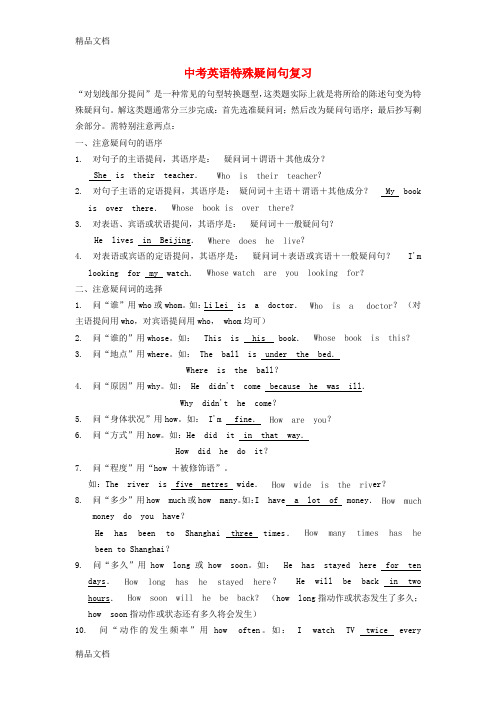
中考英语特殊疑问句复习“对划线部分提问”是一种常见的句型转换题型,这类题实际上就是将所给的陈述句变为特殊疑问句。
解这类题通常分三步完成:首先选准疑问词;然后改为疑问句语序;最后抄写剩余部分。
需特别注意两点:一、注意疑问句的语序1. 对句子的主语提问,其语序是:疑问词+谓语+其他成分?She is their teacher.?2. 对句子主语的定语提问,其语序是:疑问词+主语+谓语+其他成分? My bookis over there.?3. 对表语、宾语或状语提问,其语序是:疑问词+一般疑问句?He lives in Beijing.?4. 对表语或宾语的定语提问,其语序是:疑问词+表语或宾语+一般疑问句? I'mlooking for my watch.?二、注意疑问词的选择1. 问“谁”用who或whom。
如:Li Lei is a doctor.?(对主语提问用who,对宾语提问用who, whom均可)2. 问“谁的”用whose。
如: This is his book.?3. 问“地点”用where。
如: The ball is under the bed.Where is the ball?4. 问“原因”用why。
如: He didn't come because he was ill.Why didn't he come?5. 问“身体状况”用how。
如: I'm fine.?6. 问“方式”用how。
如:He did it in that way.How did he do it?7. 问“程度”用“how +被修饰语”。
如:The river is five metres wide.er?8. 问“多少”用how much或how many。
如:I have a lot of money.money do you have?He has been to Shanghai three times.been to Shanghai?9. 问“多久”用how long或how soon。
初中英语句型转换--特殊疑问句

初三年级英语课外练习二特殊疑问句专练姓名____________一.上节课复习。
将下列句子变为否定句和一般疑问句。
1.There were some wild animals in the forest before.2.The students should close the door when they leave.3.He’s already come back .4.Jack spoke at the meeting last Monday .5.Mr Black catches the No.1 bus to work.二.特殊疑问句专练。
(一)疑问词,词组汇总1.问是什么2.问何时3.问是谁4.问原因5.问哪一个6.问是谁的7.问怎样 8.问几点 9.问星期几10.问日期 11.问几岁 12.问距离远近13.问多久 14.问多久一次 15.问将会多久16.问有多少(可数) 17.问有多少(不可数)18.问价格(二)就划线部分提问题型的做题方法:选择疑问词,使问句结构为疑问词+ 一般疑问句。
也就是说,第一步要选择疑问词,第二步,看看题目属于哪种类型,即可以①直接引用BE动词、直接引用情态动词、has/have,还是②在句子中增加do ,does ,did .例如:1. They will have a sports meeting next week .2. Simon has lived in China for five years.________ ________ they have a sports meeting? _______ _______ ______ Simon has lived in China?3.The doctor went to Beijing for a meeting last month.4.My friend writes to me once a week ._______ ________ the doctor ________ last month? your friend ______ to you ?(三) 近词或词组对比。
初中英语七年级必备整理版句型转换陈述句变一般疑问句特殊疑问句及练习

一般疑问句:
________________________________________ 对 划 线 部 分 提 问 :
Where does he live ?
状语
疑问词 一般疑问句(省略掉画线
部分 in Beijing )
5、对谓语与宾语提问,其语序是:
疑问词(What)+ 一般疑问句(其中谓语动词要用 do 的相对应形式代替, 省略掉宾
语)
He watches TV in the evening
What does he do in the
many
词,
class.
问数量
How many boys are there in
your class?
how 多少 跟不可数名 There is some milk in the
much
词
bottle.
问数量或价 How much milk is there in
钱
the bottle?
第4页
how 多远 问路程
初中英语句型转换
一、 肯定句改的方法——一步法
1. 有 be 动词(is are am were was)/情态动词(can,could, will, would, shall,
should,must,may)的。在 be 动词/情态动词后后加 not。
2. 无 be 动词/情态动词,一般现在时在动词前加 don’t 第三人称单数前 doesn't/
that time?
He is going to watch TV this evening. 第7页
What is he going to do?
He has seen the film.
- 1、下载文档前请自行甄别文档内容的完整性,平台不提供额外的编辑、内容补充、找答案等附加服务。
- 2、"仅部分预览"的文档,不可在线预览部分如存在完整性等问题,可反馈申请退款(可完整预览的文档不适用该条件!)。
- 3、如文档侵犯您的权益,请联系客服反馈,我们会尽快为您处理(人工客服工作时间:9:00-18:30)。
初三年级英语课外练习二特殊疑问句专练姓名____________一.上节课复习。
将下列句子变为否定句和一般疑问句。
1.There were some wild animals in the forest before.2.The students should close the door when they leave.3.He’s already come back .4.Jack spoke at the meeting last Monday .5.Mr Black catches the No.1 bus to work.二.特殊疑问句专练。
(一)疑问词,词组汇总1.问是什么2.问何时3.问是谁4.问原因5.问哪一个6.问是谁的7.问怎样 8.问几点 9.问星期几10.问日期 11.问几岁 12.问距离远近13.问多久 14.问多久一次 15.问将会多久16.问有多少(可数) 17.问有多少(不可数)18.问价格(二)就划线部分提问题型的做题方法:选择疑问词,使问句结构为疑问词+ 一般疑问句。
也就是说,第一步要选择疑问词,第二步,看看题目属于哪种类型,即可以①直接引用BE动词、直接引用情态动词、has/have,还是②在句子中增加do ,does ,did .例如:1. They will have a sports meeting next week .2. Simon has lived in China for five years.________ ________ they have a sports meeting? _______ _______ ______ Simon has lived in China?3.The doctor went to Beijing for a meeting last month.4.My friend writes to me once a week ._______ ________ the doctor ________ last month? your friend ______ to you ?(三) 近词或词组对比。
1. when 问何时,范围大,what time 只能问几点钟,而how long 问多长时间,有多久。
与它对应的有for five years , since 1998, since five years ago 之类的词组。
2. how often 问频率,与它对应的有once a week , twice a year , sometimes , often , usually , neverhow soon 问将会多久。
与它对应的有in two hours , in + 时间段3.问多远,两地之间的距离不能用how long ,应该用how far .4.问数量有两个词组,划线的内容是可数的,问有多少就用how many , 而划线部分是不可数的,问有多少就用how much . how much 有两个意思,一个是有多少,另一个是问价格多少钱。
5.which 问哪一个。
与它对应的有the boy in a red shirt . I want to take the bottle on the desk(四)巩固练习。
1. English people have three names .(对画线部分提问)________ __________ names ________ English people _________ ?2. Mr Black is living in China . (对画线部分提问) ________ ___________ Mr Black ____________ ?3. We aregoing to see Uncle Wu next Sunday .______ __________ you going to _________ next Sunday ?4. He is going to the zoo this Saturday.________ __________ he _________ to the zoo ?5. Lily would like some apples . _____ _________ Lily ________ ?6. I like to stay at home because I don’t want to have classes .________ _______ you ________ to stay at home ?7. He goes to school by bike every day . ________ ________ he _________ to school every day .8. My best friend stands behind LeiLei ._______ ________ your best friend ________ ?9. You need a number 18 bus .________ bus _________ I ________ ?10. My father sometimes watches TV in the evening ._______ ________ ______your father ________TV in the evening ?11. The man over there is a doctor .________ ________ the man over there ?12. He lives on the second floor ._______ ________ ________ he ________ on ?13. Tom reads for half an hour every day ._______ _______ ________ Tom _________ every day ?14. They finished their work at 6:00 p.m ._________ ________ ________ they _________ their work ?15. It took me forty minutes to go to work last year .________ __________ ________ it ______you to go to work last year ?16. My uncle is a teacher .________ ________ your uncle do ?17. It’s Thursday today ._______ ________ is it today ?18. I t’s Ocotober 10 yesterday._______ _______ the _________ yesterday ?19. They will finish the work in ten minutes ._________ ________ will they finish the work?对下列句子划线部分提问1.I usually play soccer on weekend.__ ____ do you usually ______ on weekend?2.He always watch TV at home.___ __ ___ ___ does he watch TV at home ?3. I sleep nine hours every night.___ ___ _ ____ ____ __ do you sleep every night ?4. He should lie down and rest.___ __ _____ he ___ ____ ?5. I am visiting my grandma for vacation._ __ ___ _ you ____ __ for vacation?7. We are staying for 4days.__ ____ _ ____ are you staying ?8. They are going on the 11th.___ are they going ?9. Linda is going with her sister.____ _is Linda going ____ __ ?10.It takes him forty minutes to get there.___ __ ____ __ does it take him to get there ?11 It is 3 miles away from my home to school.__ ____ ___ ___ is it from your home to school ?13 She goes to work in a car._______ does she go to work?16. She has two cups of milk for breakfast.___ __ ____ __ milk ______ Maria _______ for breakfast?18. He was born on June 4th.______ was he born?19. The man is famous for singing English songs._______ is the man famous _______ ?20. My sister started singing at the age of five.______ _______ your sister___ ___ singing?21. I was in Shanghai last year._______ __ ___ you last year?22. He watches TV twice a week.______ ____ __ ______ he watch TV ?24. She never gets to school very early.__ ____ ____ __ does she get to school very early ?。
